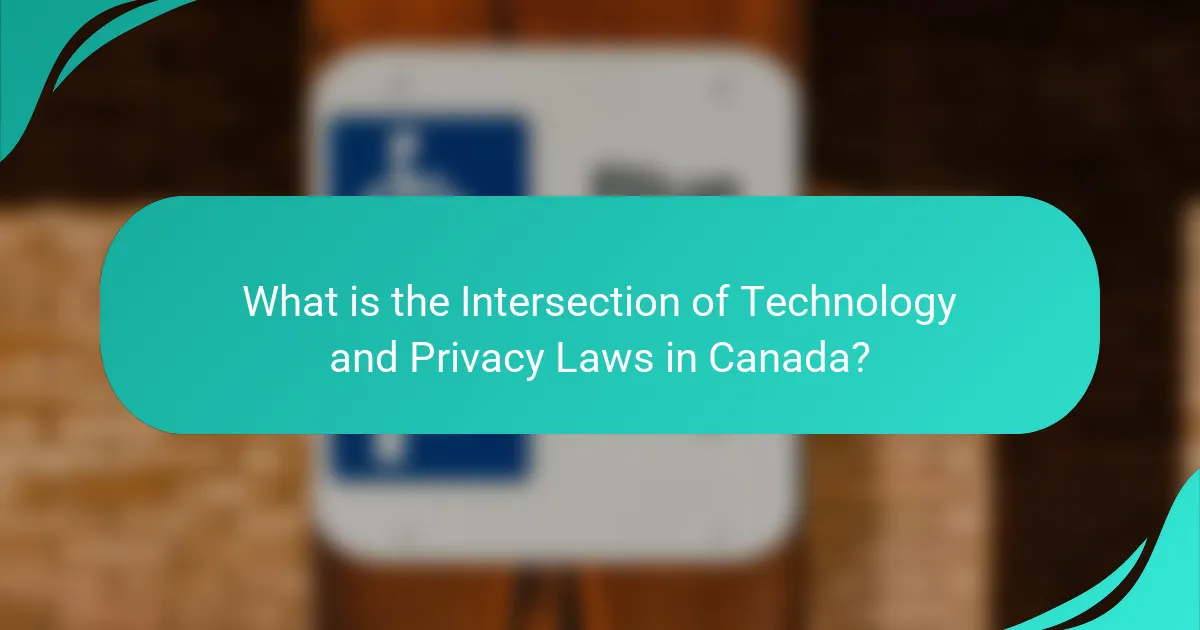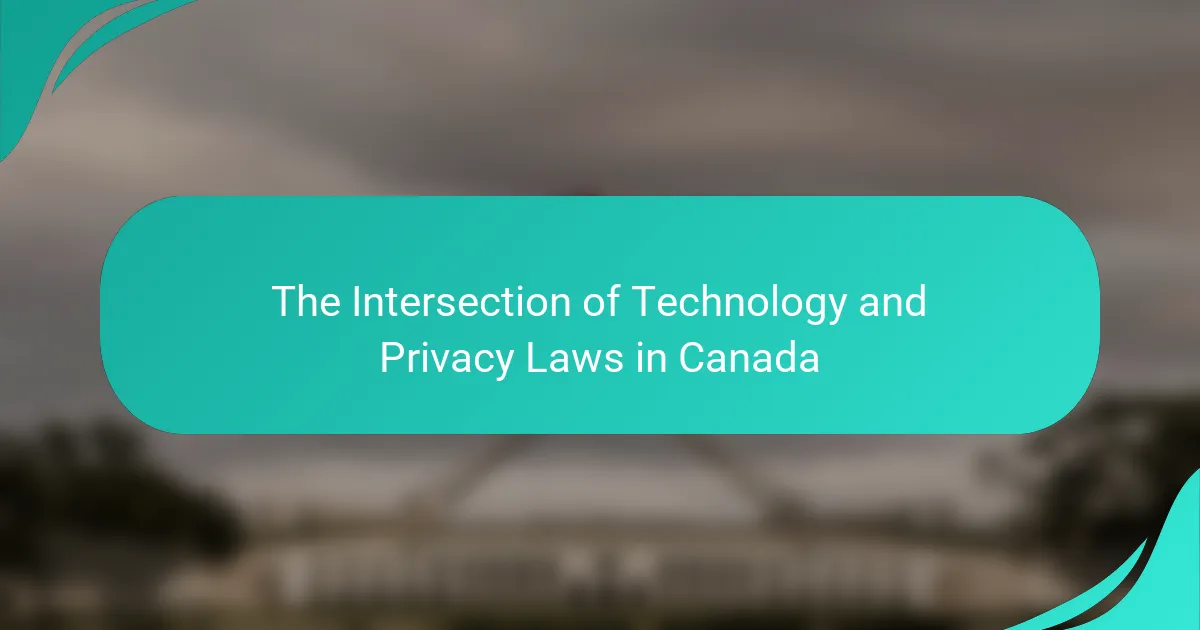
What is the Intersection of Technology and Privacy Laws in Canada?
The intersection of technology and privacy laws in Canada involves the regulation of data protection and the use of technology. Canadian privacy laws, such as the Personal Information Protection and Electronic Documents Act (PIPEDA), govern how organizations collect, use, and disclose personal information. Technology advancements, including cloud computing and artificial intelligence, challenge existing privacy frameworks. These technologies often require extensive data processing, raising concerns about individual privacy rights. The Office of the Privacy Commissioner of Canada oversees compliance with privacy laws and addresses technology-related privacy issues. Recent cases highlight the need for updated regulations to keep pace with technological advancements. As technology evolves, privacy laws must adapt to ensure adequate protection for individuals.
How do technology and privacy laws interact in Canada?
Technology and privacy laws in Canada interact through a framework that aims to protect personal information while enabling technological innovation. The Personal Information Protection and Electronic Documents Act (PIPEDA) governs how businesses handle personal data. This law mandates that organizations obtain consent before collecting, using, or disclosing personal information.
Moreover, provincial laws, such as the Personal Health Information Protection Act in Ontario, also play a critical role in specific sectors. These laws establish guidelines for data security and individuals’ rights to access their information.
The Office of the Privacy Commissioner of Canada oversees compliance and addresses complaints regarding privacy violations. Recent legislative updates, such as the Digital Charter Implementation Act, emphasize the need for transparency and accountability in data practices.
Overall, the balance between fostering technological growth and safeguarding privacy rights remains a central focus in Canadian law.
What are the key privacy laws governing technology in Canada?
The key privacy laws governing technology in Canada include the Personal Information Protection and Electronic Documents Act (PIPEDA), the Privacy Act, and the Digital Privacy Act. PIPEDA regulates how private sector organizations collect, use, and disclose personal information. It applies to organizations across Canada that engage in commercial activities. The Privacy Act governs the handling of personal information by federal government institutions. It establishes the rights of individuals regarding their personal data held by government entities. The Digital Privacy Act amends PIPEDA to enhance protections for personal information and includes provisions for breach notification. These laws collectively aim to safeguard personal information in the context of technology and digital interactions.
How has technology influenced the evolution of privacy laws in Canada?
Technology has significantly influenced the evolution of privacy laws in Canada. The rise of the internet and digital communication has led to increased data collection and surveillance. This has prompted lawmakers to revise existing privacy regulations to protect personal information. For instance, the Personal Information Protection and Electronic Documents Act (PIPEDA) was enacted in 2000 to address privacy concerns in the digital age. Additionally, advancements in technology have raised issues related to consent and data ownership. Recent developments, such as the implementation of the General Data Protection Regulation (GDPR) in Europe, have also influenced Canadian privacy law discussions. These changes reflect the ongoing need to balance technological innovation with individuals’ privacy rights.
Why is understanding this intersection important for Canadians?
Understanding the intersection of technology and privacy laws is crucial for Canadians. This understanding helps individuals protect their personal information in a digital age. With increasing data breaches and cyber threats, Canadians must know their rights regarding data privacy.
Furthermore, technology companies must comply with privacy regulations to ensure consumer trust. The Personal Information Protection and Electronic Documents Act (PIPEDA) governs how businesses handle personal data. Awareness of this law enables Canadians to hold companies accountable for data misuse.
Additionally, understanding these laws fosters informed decision-making about technology usage. It empowers Canadians to navigate online platforms safely. As technology evolves, so do privacy challenges, making this knowledge essential for safeguarding personal rights.
What are the potential risks of inadequate privacy protections?
Inadequate privacy protections can lead to significant risks for individuals and organizations. These risks include identity theft, where personal information is exploited for fraudulent purposes. Data breaches can expose sensitive information, leading to financial loss and reputational damage. Additionally, inadequate protections can result in unauthorized surveillance, infringing on personal freedoms and privacy rights. The lack of strong privacy measures can also facilitate discrimination, as sensitive data may be misused to profile individuals unfairly. According to a report by the Office of the Privacy Commissioner of Canada, 50% of Canadians are concerned about the misuse of their personal data. This highlights the importance of robust privacy protections to mitigate these risks.
How do privacy laws impact consumer trust in technology?
Privacy laws significantly enhance consumer trust in technology. When consumers know their personal data is protected, they feel safer using technological services. Regulations like the Personal Information Protection and Electronic Documents Act (PIPEDA) in Canada establish clear guidelines for data handling. Compliance with these laws demonstrates a company’s commitment to safeguarding user information. A 2020 survey by the Office of the Privacy Commissioner of Canada found that 87% of Canadians are more likely to trust organizations that comply with privacy regulations. Therefore, robust privacy laws create a framework that fosters consumer confidence in technology.

What are the current challenges at the intersection of technology and privacy laws in Canada?
Current challenges at the intersection of technology and privacy laws in Canada include balancing innovation with user privacy. The rapid advancement of technology often outpaces existing privacy regulations. Companies frequently struggle to comply with the Personal Information Protection and Electronic Documents Act (PIPEDA). There are concerns about data breaches and unauthorized data collection. The rise of artificial intelligence raises ethical questions regarding data usage. Additionally, varying provincial regulations create complexity for businesses operating nationally. The lack of clear guidelines on consent further complicates compliance efforts. These challenges highlight the need for updated legislation that addresses modern technological realities.
What are the main technological advancements affecting privacy laws?
Artificial intelligence, big data, and blockchain technology are the main technological advancements affecting privacy laws. Artificial intelligence enables organizations to analyze vast amounts of personal data quickly. This raises concerns about data security and individual consent. Big data analytics allows companies to collect and process data from various sources. It challenges existing privacy regulations by making it difficult to track data usage. Blockchain technology offers decentralized data management. This can enhance privacy by providing transparent and secure data transactions. However, it also complicates the enforcement of privacy laws. These advancements necessitate updates to privacy regulations to safeguard individual rights.
How do artificial intelligence and big data challenge existing privacy frameworks?
Artificial intelligence and big data challenge existing privacy frameworks by enabling extensive data collection and analysis. They allow organizations to gather vast amounts of personal information without explicit consent. This leads to potential misuse of data and breaches of privacy rights. Traditional privacy laws often struggle to keep pace with rapid technological advancements. For example, the General Data Protection Regulation (GDPR) was enacted in 2018, yet AI technologies have evolved significantly since then. Moreover, big data analytics can identify patterns and insights that individuals may not be aware of, further complicating consent and privacy issues. The lack of transparency in AI algorithms makes it difficult for individuals to understand how their data is being used. As a result, existing frameworks may not adequately protect individuals from intrusive data practices.
What role does cybersecurity play in protecting privacy under Canadian law?
Cybersecurity plays a critical role in protecting privacy under Canadian law. It ensures the confidentiality and integrity of personal information. The Personal Information Protection and Electronic Documents Act (PIPEDA) mandates organizations to implement reasonable security measures. These measures safeguard against unauthorized access and data breaches. In 2020, the Office of the Privacy Commissioner of Canada reported increased data breaches due to inadequate cybersecurity. Effective cybersecurity practices help organizations comply with legal obligations and protect individual privacy rights. This compliance fosters trust between consumers and businesses, essential in the digital age.
What are the gaps in current privacy legislation regarding technology?
Current privacy legislation regarding technology in Canada has several notable gaps. One significant gap is the lack of comprehensive regulations addressing emerging technologies like artificial intelligence and biometrics. Existing laws often do not account for the rapid pace of technological advancement.
Another gap is the insufficient enforcement mechanisms to ensure compliance among organizations. Many companies may not face significant penalties for breaches, leading to a lack of accountability.
Additionally, legislation often fails to provide clear guidelines on data ownership and user consent. This ambiguity can result in consumers not fully understanding their rights regarding personal data.
Furthermore, there is a lack of harmonization between federal and provincial privacy laws. This inconsistency can create confusion for businesses operating in multiple jurisdictions.
Lastly, current laws may not adequately protect against cross-border data flows. This poses risks as data can be accessed and processed in countries with weaker privacy protections.
What specific areas of technology lack sufficient legal protections?
Artificial intelligence and machine learning lack sufficient legal protections. Current laws do not adequately address issues like bias, accountability, and data privacy. Cybersecurity is another area with inadequate legal frameworks. Many regulations do not keep pace with evolving threats. Internet of Things (IoT) devices also face legal gaps. Privacy standards for these devices are often unclear. Blockchain technology lacks comprehensive regulation as well. Its decentralized nature complicates legal accountability. Lastly, [censured] recognition technology is under-regulated. There are few laws governing its use, raising ethical concerns.
How do international privacy standards compare to Canadian laws?
International privacy standards generally emphasize the protection of personal data and individual rights. Canadian laws, specifically the Personal Information Protection and Electronic Documents Act (PIPEDA), align closely with these standards. PIPEDA mandates organizations to obtain consent for data collection and use, similar to the General Data Protection Regulation (GDPR) in the European Union.
However, Canadian laws also include unique attributes. For instance, PIPEDA allows for certain exemptions that do not exist in the GDPR. International standards often focus on accountability and transparency as core principles. Canadian laws incorporate these principles but also emphasize the need for organizations to implement reasonable safeguards.
The comparison shows that while Canadian laws reflect international privacy standards, they also possess distinctive features that may affect compliance and enforcement. For example, the Office of the Privacy Commissioner of Canada has the authority to investigate complaints and make recommendations, which aligns with international practices.
Overall, Canadian privacy laws are largely consistent with international standards but contain unique attributes that differentiate them.

What are the future trends in the intersection of technology and privacy laws in Canada?
Future trends in the intersection of technology and privacy laws in Canada indicate a stronger regulatory framework. The government is expected to enhance data protection regulations. This includes the implementation of the Digital Charter Implementation Act. This act aims to modernize privacy laws in response to technological advancements. Additionally, there will be a focus on artificial intelligence and its ethical use. The Canadian government is likely to introduce guidelines for AI transparency and accountability. Increased public awareness of privacy rights will also drive changes in legislation. These trends suggest a proactive approach to balancing technology innovation with individual privacy rights.
How are Canadian privacy laws expected to evolve with technology?
Canadian privacy laws are expected to evolve to address emerging technologies. This includes adapting to advancements in artificial intelligence, big data, and the Internet of Things. Legislative frameworks will likely incorporate stricter data protection measures. Increased transparency requirements for organizations handling personal data are anticipated. Enhanced consent protocols may be introduced to empower individuals. The federal government is reviewing the Personal Information Protection and Electronic Documents Act (PIPEDA) to align with global standards. Recent discussions emphasize the need for a more comprehensive privacy law. This evolution aims to safeguard individual rights in a rapidly changing technological landscape.
What upcoming legislation may impact technology and privacy?
Upcoming legislation that may impact technology and privacy in Canada includes the Digital Charter Implementation Act. This act aims to enhance privacy protections for Canadians in the digital age. It proposes new regulations for the handling of personal data by organizations. The legislation emphasizes transparency and accountability in data collection practices. Furthermore, it seeks to establish stronger penalties for non-compliance. Another significant development is the proposed amendments to the Personal Information Protection and Electronic Documents Act (PIPEDA). These amendments are designed to modernize privacy laws to keep pace with technological advancements. The Canadian government has signaled its commitment to reforming privacy legislation to better protect citizens. These legislative changes are expected to influence how technology companies operate in Canada.
How might public opinion shape future privacy regulations?
Public opinion can significantly influence future privacy regulations. When the public expresses concern over data protection, lawmakers often respond with stronger regulations. For example, in Canada, the rise in public awareness about data breaches has led to calls for more stringent privacy laws. Surveys indicate that a majority of Canadians prioritize privacy, which pressures the government to act. Additionally, social media campaigns can amplify public sentiment, prompting policymakers to prioritize privacy in legislative agendas. This dynamic shows that as public opinion shifts, regulations are likely to evolve to reflect those changes.
What best practices can individuals and businesses adopt regarding technology and privacy?
Individuals and businesses should adopt several best practices regarding technology and privacy. First, they must implement strong password policies. This means using complex passwords and changing them regularly to enhance security.
Second, they should utilize two-factor authentication. This adds an extra layer of protection beyond just passwords.
Third, regular software updates are essential. Keeping systems updated helps protect against known vulnerabilities.
Fourth, data encryption is crucial. Encrypting sensitive information safeguards it from unauthorized access.
Fifth, employees should receive privacy training. Educating staff on privacy policies minimizes risks associated with human error.
Lastly, businesses must conduct privacy impact assessments. These assessments help identify potential privacy risks in new projects or technologies.
According to the Office of the Privacy Commissioner of Canada, adopting these practices can significantly reduce privacy breaches and enhance trust.
How can individuals protect their privacy in a tech-driven environment?
Individuals can protect their privacy in a tech-driven environment by using strong, unique passwords for their accounts. Implementing two-factor authentication adds an extra layer of security. Regularly updating software and applications helps close security vulnerabilities. Being cautious about sharing personal information on social media is essential. Using a virtual private network (VPN) encrypts internet traffic, enhancing privacy. Individuals should also review privacy settings on devices and apps to limit data sharing. Awareness of phishing scams can prevent unauthorized access to personal information. Finally, utilizing privacy-focused search engines and browsers can minimize tracking.
What steps can businesses take to comply with privacy laws in their technology use?
Businesses can comply with privacy laws in their technology use by implementing several key steps. First, they should conduct a thorough assessment of their data collection practices. This assessment identifies what personal data is collected and how it is used. Second, businesses must ensure that they obtain explicit consent from individuals before collecting their data. This aligns with regulations like Canada’s Personal Information Protection and Electronic Documents Act (PIPEDA).
Third, implementing robust data protection measures is essential. This includes encryption and secure storage solutions to protect personal information. Fourth, businesses should establish clear privacy policies that outline their data handling practices. These policies must be easily accessible to consumers.
Fifth, training employees on privacy compliance is crucial. This ensures that all staff understand their responsibilities regarding personal data. Lastly, businesses should regularly review and update their privacy practices to adapt to new laws and technologies. This proactive approach helps maintain compliance and build consumer trust.
The main entity of this article is the intersection of technology and privacy laws in Canada. The article examines how Canadian privacy laws, such as the Personal Information Protection and Electronic Documents Act (PIPEDA), regulate data protection amid technological advancements like artificial intelligence and cloud computing. It highlights the interaction between technology and privacy laws, key legislation governing data handling, and the evolving challenges posed by emerging technologies. Additionally, the article discusses the importance of understanding these laws for Canadians, potential risks of inadequate protections, and best practices for individuals and businesses to comply with privacy regulations.




